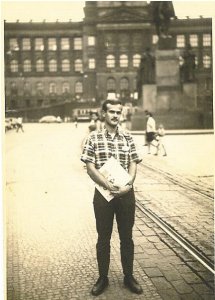By Dennis Lamb,
Toledo Chronicle, Tama News-Herald
Seventy three years ago on April 25, American and Soviet soldiers met as wartime allies against Nazi Germany in the closing days of World War II near Torgau, an obscure German town on the Elbe River.
It was a historic embrace of men in arms allied against a terrible foe that represented an existential threat to both sides. One cannot imagine what it must have been like for the two armies to meet that day in that way. But every "Elbe Day" I am reminded of an encounter I had with Soviets in Prague in 1967.
After graduating with a B.A. from the Russian department at the University of Iowa, I found myself in an intense six weeks course at Charles University in Prague studying Czech.
There were about 100 students in the course from all over the world. On the last day of the school, the Czech teaching staff wanted all the students to sing a song from their county. There were only two other Americans in the group, a young lady and another young man. We were desperately trying to think of something to sing that we all knew, which wasn't easy. In the meantime, the East Germans stood up and fervently sang an East German military marching song. Not to be outdone, the West Germans then stood up and equally fervently sang a West German military marching song. As we three Americans stood there trying to come up with something other than "Jimmy Cracked Corn," one of five Russian linguists also studying Czech at the institute came over to me and said: "Let's sing together. We'll sing the Battle Hymn of the Republic with you if you'll sing Moscow Nights with us." It was a reaffirmation of the old American-Soviet alliance in the face of the German militaristic spirit we had just witnessed and a rescue.
The only problem was that the five Russians knew all five verses to the Battle Hymn of the Republic and we Americans knew only the first verse, a bit embarrassing, as the reader can imagine. I had never spoken with any of the Russians earlier and never again saw the Russian who made the suggestion as it was the last day of school. We simply shook hands afterward and that was it, sort of a faded echo of that brief meeting of Soviets and Americans united against the Germans on the Elbe 22 years earlier.
How was it that five Russian linguists studying Czech in Prague in 1967 happened to know all the verses to the Battle Hymn of the Republic in English? I don't know, but I understand that in spite of the Cold War and official rhetoric, many Soviets maintained a warm feeling toward America because of our wartime alliance against Nazi Germany. They never forgot.
That now appears to be changing. Current Russian-American tensions are now in a dangerous spiral that potentially poses an existential threat to us all.
From Russia's perspective, it began with President George W. Bush's withdrawal from the 1972 ABM treaty in 2001; intensified with President Clinton's unprovoked decision to move NATO eastward in 1994 in violation of what Russians had understood were guarantees by Western politicians to Soviet leader Mikhail Gorbachev in 1990 that NATO would not move one inch east if the Soviet Union withdrew from East Germany (followed by NATO's 1995 attack on Russia's ally Serbia); and then really kicked in with a series of hostile actions by President Obama that again from Russia's perspective - included attempted regime change support for opposition groups in Russia in 2011, signing of the 2012 Magnitsky Act, and backing of a neo-fascist coup in Kiev in 2014.
The 1949 Soviet-era film 'Meeting on the Elbe' concludes with the observation: "The friendship between the people of Russia and America is the most important issue that mankind faces." That was true then and it's true now.
(The thoughts outlined above represent my personal views and not the views of my former employer.)
Dennis Lamb, from Chelsea, Iowa, retired from the CIA in 2002 after serving 30 years in its Directorate of Operations as a case officer and intelligence analyst.




_jpg/250px-ElbeDay1945_(NARA_ww2-121).jpg)





